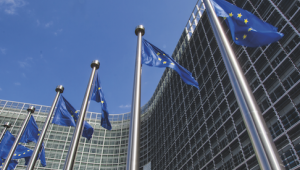The international community is still reeling from the fallout of the referendum that saw the Leave campaign triumph with 51.9% of votes cast to 48.1%.
Speaking on Friday, IMF chief Christine Lagarde, said “the British people have spoken and their decision is to be respected.”
She confirmed that a period of uncertainly is inevitable as the UK redefines its relationship with the EU. But in the meantime, it was “important there is clarity in the negotiation process, and it be carried out in as smooth a manner as possible.”
Shockwaves are still being felt across global markets and on Monday, the pound hit a new 31-year low against the dollar.
Lagarde welcomed the measures announced by the Bank of England and the European Central Bank to support the banking system and said the fund would do “what is necessary” to guard against excess volatility.
“The IMF will continue to monitor developments closely and work with its members to ensure the resilience and stability of the global economy in the period ahead,” she added.
Meanwhile, United Nations secretary-general Ban Ki-moon said that despite the result he expects the EU to continue to be “a solid partner for the UN on development and humanitarian issues, as well as peace and security, including migration.”
He also expressed his hope that the UK will “continue to exercise its leadership in many areas, including international development”.
At the weekend, the UK’s commissioner to the EU, Lord Jonathan Hill, announced his resignation, adding his name to the list of British politicians whose careers have been cut short by the referendum’s outcome.
Hill, who was EU commissioner for financial stability, financial services and capital markets union, said in a statement he was “very disappointed” about the result, but that he couldn’t continue in post “as though nothing had happened.”
He implied that he had agreed with EU Commission president Jean-Claude Juncker “some weeks ago” that he would step down in the event of a Brexit.
Hill added that, although he went to Brussels as a Eurosceptic, he would leave it “certain that, despite its frustrations, our membership was good for our place in the world and good for our economy.”
Ángel Gurría, secretary-general of the OECD, the grouping of advanced economies, confirmed the decision would have major consequences for the UK and the EU.
He said: “Although this was not the OECD’s recommended course of action… the focus must now shift to dealing with the outcome of this democratic process.
“The OECD will spare no efforts in supporting [the UK] to make the transition as smooth as possible and advance the country’s economic and social agenda,” he confirmed.
“We will also help the European Union and the international community best address the consequences of such a decision and chart the way forward.
“The OECD believes that openness, integration and diversity will make our economies and societies stronger and fairer.”













